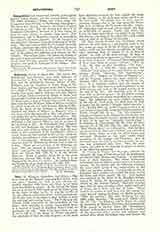

Sexagesima (Lat. sexagesima, sixtieth), is the eighth Sunday before Easter and the second before Lent. The Ordo Romanus, Alcuin, and others count the Sexagesima from this day to Wednesday after Easter. The name was already known to the Fourth Council of Orleans in 541. For the Greeks and Slays it is Dominica Carnisprivii, because on it they began, at least to some extent, to abstain from meat. The Synaxarium calls it Dominica secundi et muneribus non corrupti adventus Domini. To the Latins it is also known as “Exsurge” from the beginning of the Introit. The statio was at Saint Paul’s outside the walls of Rome, and hence the oratio calls upon the doctor of the Gentiles. The Epistle is from Paul, II Cor., xi and xii describing his suffering and labors for the Church. The Gospel (Luke, viii) relates the falling of the seed on good and on bad ground, while the Lessons of the first Nocturn continue the history of man’s iniquity, and speak of Noah and of the Deluge. (See Septuagesima.)
FRANCIS MERSHMAN


